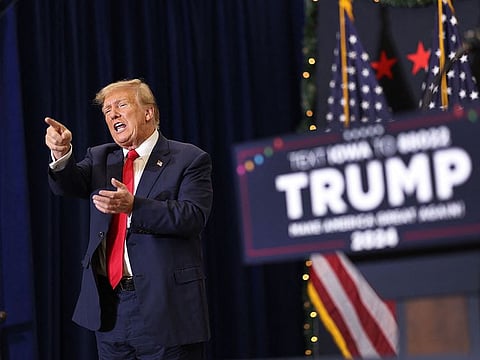Colorado Supreme Court removes Trump from presidential ballot. What’s next?
Key points from Colorado’s historical ruling on Trump’s eligibility under 14th Amendment

In an unprecedented twist, the Colorado Supreme Court ruled on Tuesday that former US President Donald Trump is barred from appearing on Colorado’s ballots for the upcoming presidential election.
What’s the jaw-dropping reason behind this game-changing decision? It marks the first-ever court declaration that the 14th Amendment’s insurrection clause directly points at Trump, tying him to the chaos of the infamous Jan. 6 Capitol riot.
The Trump campaign, not one to back down, is now gearing up for an all-out legal brawl, vowing to file a desperate appeal to the US Supreme Court.
Here are the key points from Colorado’s historical ruling on Trump’s eligibility under the 14th Amendment’s ‘Insurrectionist Ban’
Trump’s alleged involvement in insurrection
The Colorado Supreme Court, in a 4-3 decision, affirmed that Trump engaged in the insurrection that took place on Jan. 6, 2021, attempting to overturn the 2020 election. The court emphasised that Trump’s actions were not protected by the First Amendment, citing his speech as incitement to violence.
Legal hurdles cleared
The Colorado Supreme Court ruling upheld the trial judge’s findings on crucial legal aspects, establishing that the Jan. 6 incident qualified as an insurrection and that Trump actively participated in it. These determinations were essential prerequisites for considering Trump’s disqualification under the 14th Amendment.
Application of ‘Insurrectionist Ban’ to the Presidency
The Colorado Supreme Court departed from the trial judge’s decision by asserting that the ‘insurrectionist ban’ applies to the presidency. While Section 3 of the 14th Amendment explicitly prohibits insurrectionists from holding various offices, including senators and representatives, it doesn’t explicitly mention the presidency. However, the court argued that the presidency is undeniably an ‘office’ under the United States, contradicting the trial judge’s interpretation.
Role of the US Supreme Court
Acknowledging that the case is far from concluded, the matter now heads to the US Supreme Court. The ultimate decision rests with the highest court, and questions linger regarding the timeline and procedures. Trump, facing the prospect of being excluded from the ballot, will rely on the US Supreme Court, where he appointed three conservative justices, to salvage his electoral ambitions.
Shifting dynamics and political implications
The dynamic has changed. Trump campaign’s fate now hinges on the US Supreme Court’s decision, introducing an element of uncertainty into the upcoming political calendar, particularly the impending Iowa caucuses. The case’s outcome will likely have repercussions on the broader GOP primary season.
The ruling has been variously hailed as extraordinary and unprecedented. The Colorado Supreme Court decision adds a layer of complexity to an already contentious debate surrounding Trump’s eligibility, reflecting the intersection of legal interpretation and political consequences.
The broader consequences for America’s democratic processes and electoral landscape remain unclear as this extraordinary case continues to evolve.
What happened on Jan 6, 2021
On January 6, 2021, a mob of Trump supporters attacked the United States Capitol Building in Washington, D.C. This occurred two months after Trump's defeat in the 2020 presidential election. The mob aimed to keep Trump in power by obstructing a joint session of Congress from counting the Electoral College votes, which would confirm the victory of President-elect Joe Biden.
Sign up for the Daily Briefing
Get the latest news and updates straight to your inbox



